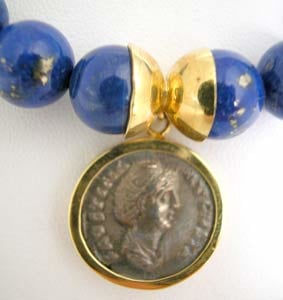Silver Denarius of Roman Empress Faustina, 138 CE - 161 CE
Silver/Gold
FJ.2240
Further images
Beautiful as the moonlit sky shot through with golden stars, lapis lazuli has been treasured since the dawn of civilization. Its sources are few, mostly in eastern mines of what...
Beautiful as the moonlit sky shot through with golden stars, lapis lazuli has been treasured since the dawn of civilization. Its sources are few, mostly in eastern mines of what is now Afghanistan, and its rarity made it the favored jewel of ancient royalty. The kings and queens of Mesopotamia had their cylinder seals carved of lapis; the Egyptians made their most precious amulets from it. So eager were the Egyptians for objects made from lapis that they created an imitation paste from the ground stone. During the Renaissance, the rich ultramarine of the great master paintings was also made from powdered lapis, brought overland on arduous journeys that took years. Poets from Ancient Sumer through the modern age have used it as metaphor of beauty and rarity. Besides its appealing loveliness, the gem is thought to have curative powers and is used as a remedy for fever, gall-stones, sleeplessness and above all, melancholy. Who, looking upon this splendid stone could feel anything but happiness?





